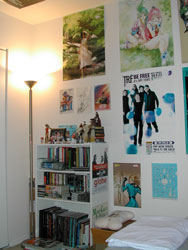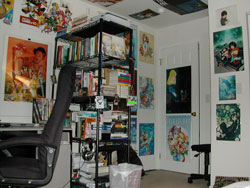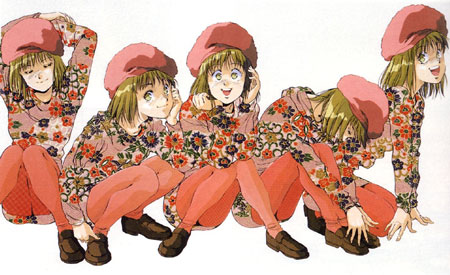On Friday, I came across the following article on the Mainichi Daily News site, in the WaiWai section (which generally features tabloid journalism):
Self-professed 'real otaku' rips into 'moe' fetish fakers.
While the article, featuring harsh commentary by manga artist Mimei Sakamoto, is clearly meant to ruffle feathers and create a stir, it provides an interesting perspective on otaku identity politics in Japan. The article brings up some points that I'd like to discuss.
Non-otaku in the mainstream Japan criticizing otaku culture is nothing new. Less common are those people who are deep into otaku culture who have a problem with either a) certain subfactions of otaku, and/or b) mainstream perceptions of otaku. Previously, when otaku were still heavily discriminated against (in the years following the Miyazaki incident), we had well-known figures such as Toshio Okada and Takashi Murakami speaking up in defense of otaku culture. Now, however, as otaku have become more mainstream and accepted in Japanese society, we have otaku such as Toru Honda and Mimei Sakamoto speaking out against the current "otaku boom", but each with a very different message.
As I
wrote about in an earlier blog post, Toru Honda is a hardcore otaku who speaks in favor of otaku culture, but is not pleased with the sterile and cutesy image of otaku that now dominates Japanese media. Instead, Honda prefers to emphasize the darker and more dangerous side of otaku (i.e. the extreme otaku who prefer stylized 2D female characters over real life women). Mimei Sakamoto, who also considers herself an otaku, is likewise displeased with the new glamorization of otaku culture. In direct contrast to Honda, however, Sakamoto's main criticism is that celebrating otaku who are unstylish and interested in moe has the unfortunate side effect of justifying the darker side of otaku obsessiveness (a side she definitely disapproves of).
In particular, Sakamoto rails against
moe as being "pedophiliac fetish" and "nothing more than perversion", and also criticizes otaku for being "incapable of recognizing reality" and being "incapable of being in a normal loving relationship". In response to this, I feel compelled to defend moe in principle because I don't think there is anything wrong with or perverse about enjoying well-drawn characters and finding them attractive, any more than it's wrong to feel attracted to an interesting character in a novel or television show.
It is true that some anime and game characters designed to be attractive to otaku are very young looking (clearly drawn to look like minors, in other words), a fact that has certain moral implications to be worked out by the individual who chooses whether or not to like them. So far, in the United States, even when such drawings are explicitly pornographic (and most of them are not), they have been deemed legal and protected speech, in that they do not directly harm real life children (unlike actual child pornography which is widely agreed to be a form of child exploitation and abuse).
Sakamoto's argument against moe on the basis that it is "pedophiliac" suffers when one considers that a) not all moe characters look like children, b) moe characters are not always portrayed in a sexualized manner, and c) those who appreciate young characters do not necessarily view them in a sexual way (in fact, some people define moe as having nothing to do with sexual feelings).
That said, I do understand somewhat where Sakamoto is coming from. While there is plenty of innocuous moe stuff out there (a lot of it is just really cute), one cannot deny the existence of
some moe that portrays young characters in less than innocent ways, and whatever you think about such images, it's not surprising that Sakamoto is upset by them. The bigger issue is whether or not such images should be banned completely. According to an
Anime News Network poll conducted last year, about 39% of American anime fans do not think they should banned, 20% think they should be banned in certain situations, but not others, while only 29% think they should be banned completely (the remaining 12% were undecided). When debating the issue, many fans defend such images on the basis of free speech (and a perspective that denies the existence of thought crimes), though they also respect that not everyone has to personally like or approve of such images, and certainly noone should be forced to look at them.
Sakamoto brings up a related issue that is even more controversial--the "idolizing" of young girls in Japan (which is more than just an otaku thing). U-15 (under 15) idol stars appear to be gaining in popularity in Japan, but not without some
serious concern and criticism. Like Sakamoto, I see this (the popularity of sexualized young idols) as a disturbing trend; it seems very close to being (or maybe just is) a form of child exploitation. Young models exist in the US as well, but they aren't as mainstream here, and they too are surrounded by a fair bit of controversy.
In contrast, Sakamoto's complaint about otaku liking "women wearing spectacles" seems unimportant, akin to complaining about men liking women who wear swimsuits at the beach. Being angry at those who fetishize glasses-wearing seems unnecessary at best, intolerant at worst, similar to her displeasure regarding those "guys walking around in thick glasses and checkered shirts". (I've never been a master of fashion, but my wife likes me just fine, thank you very much.)
Sakamoto is not necessarily wrong to question otaku who are "incapable of recognizing reality" and "incapable of being in a normal loving relationship", assuming that most of us agree that reality and healthy relationships are important. There are some otaku who really are like that, and maybe they could use some help. It's important to note, however, that not all (or even most) otaku are thus afflicted; hopefully, Sakamoto realizes that.
While I think Sakamoto is overly harsh and often overgeneralizes, I do appreciate the fact that she is willing to speak out against specific things she does not like about otaku culture, and the specific way it is being popularized in Japan.
To me, not all moe is as bad as she makes it out to be. Likewise, not all otaku are incapable of healthy social relations. On the other hand, I do think it's somewhat of a shame that when talking about otaku, the Japanese media focuses so heavily on moe and otaku who have trouble socializing with non-otaku. Light-hearted
news segments about 'weird otaku' and
business reports regarding the massive amounts of money moe generates for the Japanese economy have overshadowed any serious discussion of the deeper sociological (and moral) issues surrounding otaku culture.
From my perspective, there are so many interesting things about otaku that are almost never talked about. Sakamoto touches on one of those things in her complaint that "otaku are caught up in this money making cycle and all they're doing is spending their hard-earned yen". The way that otaku choose to consume and engage with media and other technology is a topic close to my heart. Maybe the situation is different for otaku in Japan (since Japanese otaku are the direct target audience for many anime), but I feel that otaku in America have a long history of having a certain amount of control over their media consumption, that they are able to consume on their own terms, whether by maintaining vast fansub networks that exist outside of mainstream distribution channels, or by maintaining close relations and open dialogue with American anime publishers. (My forthcoming PhD dissertation will discuss this further)
Finally, I can't quite make sense of the final paragraph about "real otaku" shutting themselves away from the world. Perhaps the translation was poor. Reading that paragraph, I wonder if Sakamoto has some significant self-esteem issues, if she feels conflicted about her otaku identity. While the mainstreaming of all things labeled "otaku" is not necessarily good for society, her solution of locking oneself up seems even more destructive (and reminiscent of Japan's hikikomori problem).




